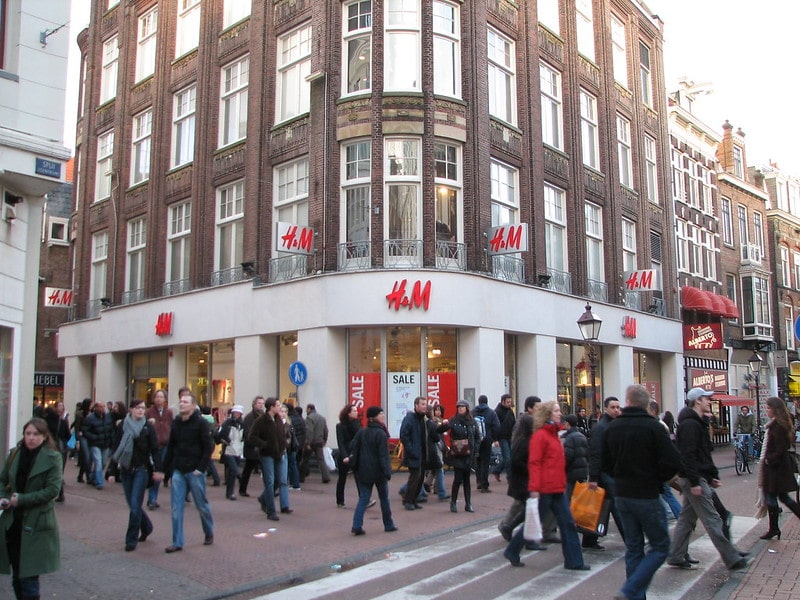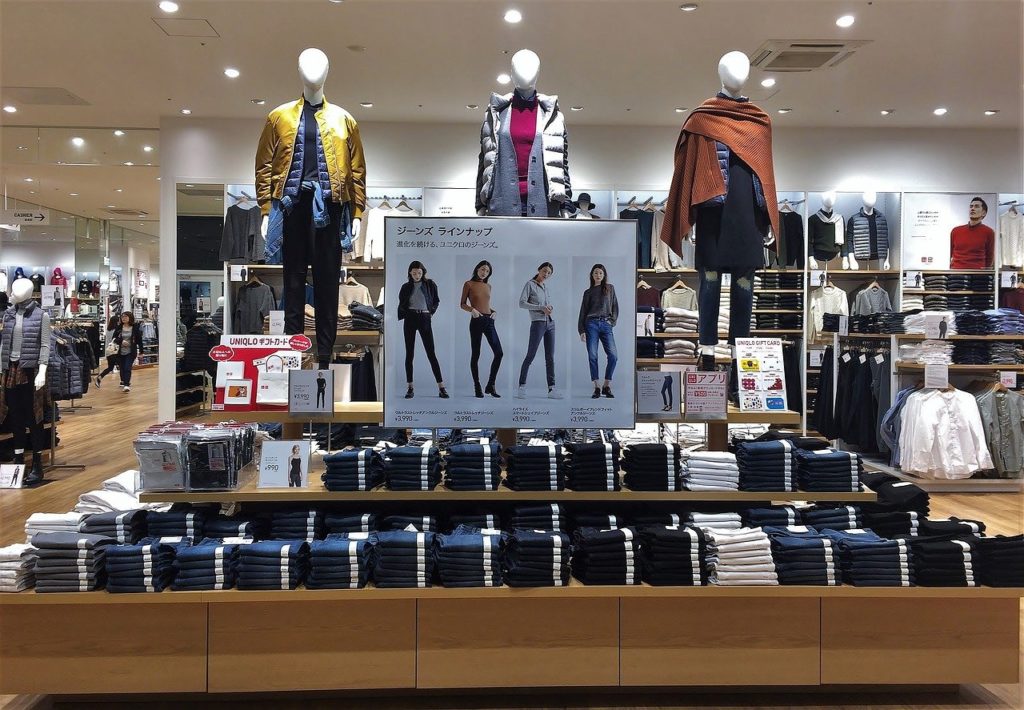Where Is Most Waste Found in the Supply Chain in Fast Fashion
7 Fast Style Companies Responsible for Environmental Pollution

Fast fashion, which refers to the business model within the style industry that relies on cheap and speedy product of low quality clothing to meet the latest and newest trends, has detrimental effects on the environment. This e'er-growing throwaway civilization generates an estimated 92 million tonnes of textiles waste globally every twelvemonth, and is expected to soar up to 134 million tonnes a year by 2030. What's more, the fast-paced manufacturing procedure of the manufacture contributes to nearly 10% of global carbon emissions and nearly xx% of global wastewater. While the average shopper has likely purchased from cloth and environmental polluters earlier, here are vii of the biggest fast fashion companies to avoid moving forrard.
—
Zara
I could make the argument that Zara was the showtime fast fashion company in the earth. Commencement coined by the New York Times in the early 1990s, Castilian wearing apparel giant Zara famously touted its power to turn a garment from the design stage to existence sold in stores in but fifteen days. Most three decades later, the retail firm now puts out 12,000 new designs and manufactures more than 450 million wearable items every day. It's without a dubiousness one of the fastest clothing turnover in the fashion industry. Though the clothing company has appear plans to use only cotton and polyester materials that are both sustainable and recyclable, every bit well as reducing and offsetting all emissions by 2040 , information technology is nowhere nigh enough to combat its electric current fast style business model and high carbon footprint in its supply chains, which the visitor has fabricated no mention to slow down.
 Epitome past: Tnarik Innael/Flickr
Epitome past: Tnarik Innael/Flickr
H&Thou
The 2nd-largest fashion retailer in the earth, H&Chiliad, has contributed monumental amounts of textile waste over the years and continues to churn out millions of clothing items and blueprint every twelvemonth. With more than than 5,000 stores worldwide, H&M is one of the many fast fashion companies known for copying high finish fashion, rapid clothing turnover, and unsustainable practices, including previously using harmful chemicals such as PFCs, phthalates, and APs/APEOs in its products. The retailer has also been defendant of inhumane working atmospheric condition and failure to pay 850,000 garment workers a living wage . Though the brand has promised to provide better wages, a 2018 inquiry discovered that workers in India and Turkey earned well-nigh a tertiary of the estimated livable wage .
The fast manner company has since made attempts to adopt more sustainable practices, from implementing a habiliment collection and recycling plan inside its stores, to the launch of its Conscious collection in 2011 where items are fabricated with at to the lowest degree "fifty% sustainable materials". H&M as well publicly set the goal of using only recycled and sustainably-sourced materials past 2030. However, many criticised its sustainability claims to be vague and greenwashing, highlighting the lack of transparency in regards to reducing its environmental affect and carbon emissions throughout the supply chain.
Forever 21
Items made at this American clothing company are almost exclusively made with synthetic fabrics, which are not biodegradable nor be recycled after its use. According to an investigation done past the Los Angeles Times in 2017, one Forever 21 worker can produces upwardly to 700 shirts a day, which amounts to insurmountable volumes of material waste matter and pollution every year. Forever 21 was too found to vastly underpay its factory workers. The US Labour Department discovered workers were paid as little every bit USD$4 an hr , far below the state's minimum wage, and was sued for multiple violations in Los Angeles and abroad. What's more, the company failed to sign the Bangladesh accord, which guarantees garment workers' prophylactic and rights. Despite Forever 21'due south attempts to be more environmentally supportive, including its American Wood capsule collection which donates $one to "help conserve and restore healthy forests" , and claims to utilize 100% recyclable plastic and paper carriers bags, the fast fashion retailer has made no plans to accost its material pollution problem and environmental impacts.
 Epitome past: Pixabay
Epitome past: Pixabay
Uniqlo
I of the all-time known fast style companies that originally hailed from Japan, Uniqlo owns over 3,000 stores across the globe and offers clothing items at depression costs. The Japanese brand uses significant amounts of cheap synthetic materials, including rayon, polyester, nylon, and elastane, which cannot be recycled or break down when they're tending of, contributing to the global plastic and microfibres pollution. Uniqlo also doesn't present whatsoever certification for their textiles. Much like other fast fashion companies, Uniqlo has had multiple labour rights violations and complaints. In 2015, the company withheld $5.5 million of severance pay from its workers subsequently abruptly closing downwards two of its facilities in Indonesia. The following year, an investigation in China plant repeated unpaid overtime for workers and unsafe working environments. Though the make has since signed the Bangladesh Accord.
In an effort to improve its sustainability, Uniqlo introduced a recycling and donation program , which encourages consumers to bring unwanted article of clothing (its own brand) to its stores, some of which will be redistributed to refugees, disaster victims and others in need. Downward garments in particular, can be converted into new products. Though the brand is implementing initiatives to reduce water and energy employ, too equally a carbon emission reduction target, reports say that the company has withal to disclose any progress in meeting this target.
You lot might besides similar: The 9 Biggest Fast Fashion Statistics
Shein
Undoubtedly one of the most popular fast mode companies among Generation Z shoppers, and famously using social media platforms like TikTok to market its products, Shein has become one of the biggest contributors to textile and environmental pollution in contempo years. The make adds at least 500 products on their website everyday, co-ordinate to a 2020 printing release , and sells more than 36 million pounds of appurtenances globally a twelvemonth. It is no stranger to copyright infringement issues for stealing designs directly from high-end article of clothing companies. To combat growing bad press, Shein launched its " Our Products/Our Planet" entrada , which claims to produce 50-100 items for every production, and volition only implement large-calibration production when the product is in high demand, though stops brusk of detailing what the threshold is, or committing the switch towards sustainable fabrics and materials. The Chinese online retailer also recently falsely stated on its website that atmospheric condition in the factories it uses were certified by international labor standards bodies, which has prompted a number of labour watchdogs to question how information technology produces its clothing at such depression prices.
Mango
Mango is another Castilian mode company with stores located in more than 110 countries. In 2013, a People's republic of bangladesh garment factory with 29 brands, including Mango, manufacturing inside collapsed, resulting in the death of more than 1,000 workers with some other 2,400 injured. Only nine companies offered compensation to the victims and Mango was not amidst them. The Bangladesh Accordance was too created in the wake of the tragedy.
However the brand has been making progress on the sustainability front. Across the company's entire line of 18,000 products, 44% of which uses sustainable materials and has moved to eliminate the chancy chemicals PFCs from its items. Despite disclosing its carbon footprint and greenhouse gas emissions across its supply chain, Mango has made no movement to set a target to lower them.
ASOS
Short for "As Seen On Screen," ASOS is a British online-only retail that offers more than 850 brands including their own on its platform. Similar to Shein, the digital manner retailer adds as many as seven,000 new products and styles every week to keep upwards with ongoing trends, which makes it all the more than popular with younger shoppers. The fast manner concern model relies on the rapid production of low-quality clothing, and ASOS is a prime number example of that where many criticised the clothing the company produces does non fit the style they're advertised.
While ASOS made a public commitment to reduce its greenhouse gas emissions from its ain operations and supply chain by 2020, reports say there has been evidence to suggest progress has been made, nor have there been any water reduction initiatives in virtually of its supply chain.
Yous Might Also Like
2934

0 Response to "Where Is Most Waste Found in the Supply Chain in Fast Fashion"
Post a Comment